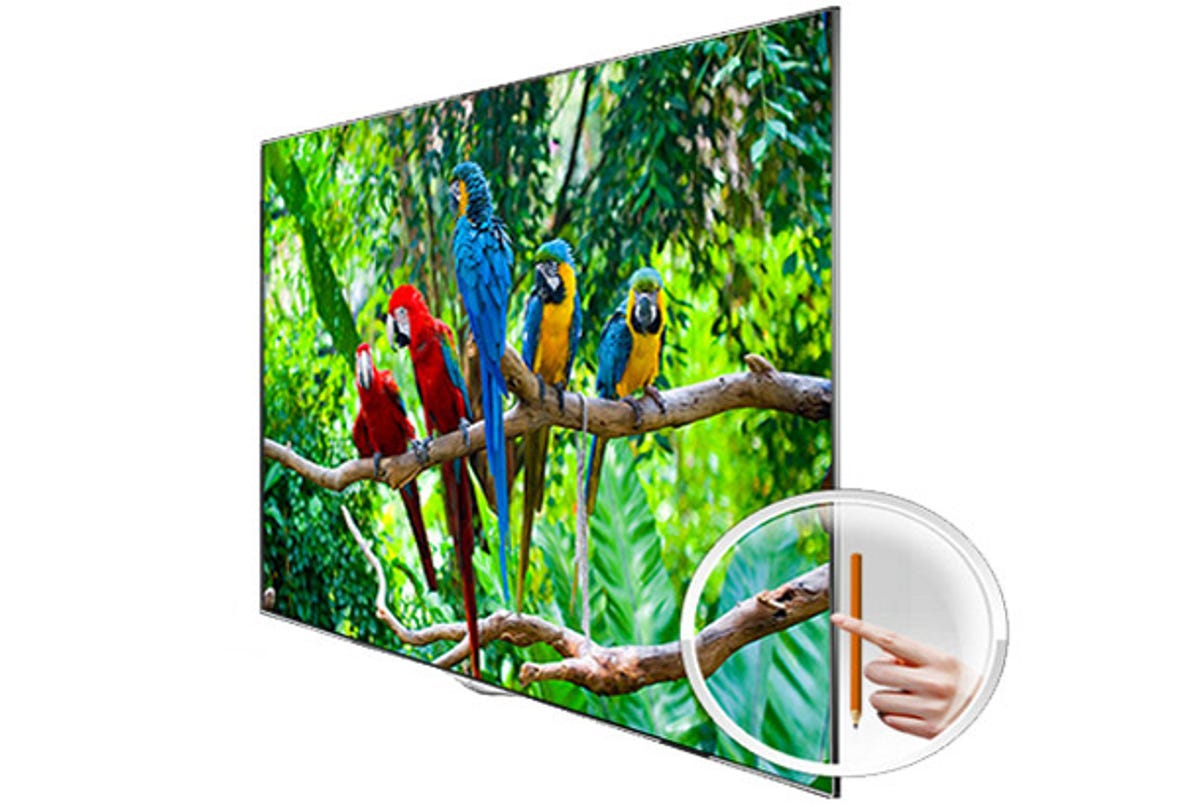
LG
Editors’ note: This post was updated August 16, 2013, with new information.
Rumors are still flying about the next great TV technology: organic light-emitting diode.
It’s difficult to pry info out of the companies involved, but I figured it was worth putting down what we know, what we think we know, and what we know we don’t know, ya know?
OK, go.
Hardware
What we know: OLED is the next generation of TV technology. It has the best performance characteristics of plasma and LCD, with few of the drawbacks of either. At the Consumer Electronics Show in January 2013, both LG and Samsung announced they would ship 55-inch OLED TVs this year. And they have (more on this later).
For more specifics, check out my article “What is OLED TV?“
LG is using RGBW, or red, green, blue, and “white” subpixels (as described in the above link). Samsung has affirmed its fealty to RGB (no “white” subpixel). What we don’t know is what Sony and Panasonic (see below) are going use. Will there be a performance or price difference between the different versions? We don’t know.
Which leads to…
Performance
What we know: Wow. OLED is just…wow. Seriously. OLED is way better than the best plasma, and makes the best LCD look like a cell phone screen circa 1998. The trick is being able to turn off individual pixels, for a black that is actually the absence (or near enough to it) of light. Even the best plasmas can’t do this; even when the pixel is “off,” it’s still energized slightly, emitting some light. The closest LCDs come is with local-dimming backlit LEDs, which can only dim large areas, not specific pixels.
So, will this give the best contrast ratio ever? Perhaps. I’ve seen OLED up close several times now, and it’s blown me away each time.
Others I’ve spoken to have felt the same. Gary “HD Guru” Merson had a chance to look at the LG up close at an unveiling in Monoco. CNET Asia’s Philip Wong had a hands-on with the 55EM9600 and came away impressed. And of course, when we all saw it at CES, we gave it our Best of CES Award.
Our own David Katzmaier checked out the Samsung KN55S9C and said it was “the best picture quality we’ve seen.”
Related stories
- LED LCD vs. plasma vs. LCD
- Active 3D vs. passive 3D: What’s better?
- When HD isn’t HD
- Contrast ratio (or how every TV manufacturer lies to you)
- How big a TV should I buy?
- Why all HDMI cables are the same
- 4K vs OLED
And, if you want to step into the way-back machine, Sony’s adorable XEL-1 OLED “TV” got CNET’s David Katzmaier to write: “The short story on performance is that the Sony XEL-1…displayed the deepest black levels we’ve ever seen from a shipping TV.”
What we don’t: Other factors like image retention and lifespan are all things we’ll have to wait to see. Contrast ratio and brightness, at least from what we’ve seen so far, have been incredible. As amazing as OLED is, no technology is perfect.
Manufacturers
What we know: LG has launched the 55EA9800. Samsung has the KN55S9C. Check out LG and Samsung OLED HDTVs available now: What you need to know for more info. The only other big news is that Sony and Panasonic have announced a partnership to build OLED TVs. Don’t expect any models soon; they’re looking to start production next year.
What we don’t: These are the big names in the TV world right now, though they’re not the only names. Given the financial woes of some of the other big Japanese TV makers, I don’t expect serious OLED announcements from anyone else anytime soon. CES, maybe?
The real question is China. China makes a lot of LCDs. The conversion from LCD manufacturing to OLED manufacturing isn’t trivial, but if you want something done fast and cheap, who does it better than the Chinese? Right now I’d be surprised if any Chinese manufacturer, with no track record in the high end of the market, comes out with an OLED. In a few years, though, count on it.
Price
What we know: They’re certainly expensive. LG’s 55-inch is $14,999. Samsung’s 55-inch is $8,999. It’s important to keep in mind that the first mass-market plasmas were 42 inches, $15,000, and looked terrible. Mind-bogglingly bad. So OLED’s pricing needs to be taken in context. These are just the first generation. It won’t be long before we mortals can afford OLED TVs, and by then they’ll look even better.
What we don’t: Will we see larger, cheaper OLEDs next year? I sure hope so.
Shipping
What we know: Samsung and LG’s models are available right now.
What we don’t: Anything else. Larger models. Other companies (Sonysonic? Panany? Pony? Definitely Pony). FLAT models. Hopefully we’ll learn more at CES 2014 in January.
Bottom line
OLED is awesome, and you’ll probably have it in your house eventually. It’s crazy expensive right now, but it won’t always be that way…
In the meantime, bookmark this page and I’ll update it when we find out any new info.
Got a question for Geoff? First, check out all the other articles he’s written on topics like HDMI cables, LED LCD vs. plasma, active vs. passive 3D, and more. Still have a question? Send him an e-mail! He won’t tell you what TV to buy, but he might use your letter in a future article. You can also send him a message on Twitter @TechWriterGeoff or Google+.




